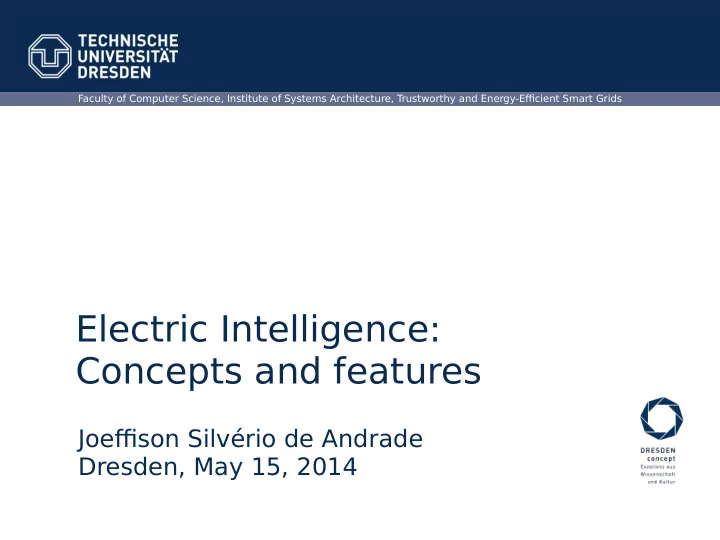

Faculty of Computer Science, Institute of Systems Architecture, T rustworthy and Energy-Effjcient Smart Grids Electric Intelligence: Concepts and features Joeffjson Silvério de Andrade Dresden, May 15, 2014
Electric-Load Intelligence (E-LI): Concept and Applications • Electric-Load Intelligence (E-LI) develop new knowledge and apply it intelligently with technologies to enhance the value of electricity. - both intelligence gathering on electricity usages and smart applications of technologies to enhance the electricity services. monitoring, communication, analysis, interface, decision making, control and learning capability TU Dresden, May 15, 2014 Revising 2 papers Folie 2 von 20
Electric-Load Intelligence (E-LI): Concept and Applications • Monitoring Capturing and storing data (information about loads) The applications may dictate the kind of data required and decisions to be made. [which.co.uk] TU Dresden, May 15, 2014 Revising 2 papers Folie 3 von 20
Electric-Load Intelligence (E-LI): Concept and Applications • Communication transmission of data and/or controls among the stakeholders (customers, service providers, appliance manufacturers or even regulators) and associated devices. TU Dresden, May 15, 2014 Revising 2 papers Folie 4 von 20
Electric-Load Intelligence (E-LI): Concept and Applications • Analysis consists on analyzing the data, deriving knowledge to suggest alternatives to better outcomes. TU Dresden, May 15, 2014 Revising 2 papers Folie 5 von 20
Electric-Load Intelligence (E-LI): Concept and Applications • Interface The presentation of load data, analysis results, control alternatives and fjnal decisions to customers and service providers. TU Dresden, May 15, 2014 Revising 2 papers Folie 6 von 20
Electric-Load Intelligence (E-LI): Concept and Applications • Decision Making: The decision taken after the outcome of analysis to achieve a prescribed objective - safety, effjciency, cost, etc TU Dresden, May 15, 2014 Revising 2 papers Folie 7 von 20
Electric-Load Intelligence (E-LI): Concept and Applications • Control The instructions sent to devices/systems to improve performance or achieve desired outcomes. TU Dresden, May 15, 2014 Revising 2 papers Folie 8 von 20
Electric-Load Intelligence (E-LI): Concept and Applications • Learning The ability of incorporating new knowledge into future analysis and decision making. TU Dresden, May 15, 2014 Revising 2 papers Folie 9 von 20
Electric-Load Intelligence (E-LI): Concept and Applications • Load Signatures Disaggregation Disaggregation is to take a composite load and break it into a set of load signatures of identifjable devices. - Ability to track the usage and devise suitable optimization schemes to improve performance. TU Dresden, May 15, 2014 Revising 2 papers Folie 10 von 20
Electric-Load Intelligence (E-LI): Concept and Applications • Load Signatures Disaggregation Optimization Problem Find the best "fjt" to a composite load with a set of given load signatures TU Dresden, May 15, 2014 Revising 2 papers Folie 11 von 20
Electric-Load Intelligence (E-LI): Concept and Applications • Applications Of Load Signature Studies Information of detailed energy usage to help customers benefjt from time-of-use tarifg; Health monitoring for mission critical, high value equipment or systems, e.g. in a data centers; Facility management tools to provide energy savings in buildings; Monitoring individuals or systems with specifjc needs based on their electricity usage patterns, e.g. senior living alone or remotely operated equipment; Switching ofg non-essential loads (e.g. air-conditioners) in emergencies if the power system is in danger of collapse or breaking-up. TU Dresden, May 15, 2014 Revising 2 papers Folie 12 von 20
Load Signature Study—Part I: Basic Concept, Structure, and Methodology • Load Signature The electrical behavior of an individual appliance when it is in operation TU Dresden, May 15, 2014 Revising 2 papers Folie 13 von 20
Load Signature Study—Part I: Basic Concept, Structure, and Methodology • Composite Load CL is more complicated in nature because the unique features from individual appliances are mixed and sometimes certain features may even be masked or lost TU Dresden, May 15, 2014 Revising 2 papers Folie 14 von 20
Load Signature Study—Part I: Basic Concept, Structure, and Methodology • Micro Level Any load collected using a sampling interval that is faster than 1 sample per cycle TU Dresden, May 15, 2014 Revising 2 papers Folie 15 von 20
Load Signature Study—Part I: Basic Concept, Structure, and Methodology • Macro Level Any load collected by using a sampling interval that is slower than 1 sample per cycle TU Dresden, May 15, 2014 Revising 2 papers Folie 16 von 20
Load Signature Study—Part I: Basic Concept, Structure, and Methodology • Current Waveform Provides one of the most complete sets of information to describe load behavior TU Dresden, May 15, 2014 Revising 2 papers Folie 17 von 20
Load Generator • Next steps On the next versions of the tool, we want to include features/measurements useful for existent analysis Example TU Dresden, May 15, 2014 Revising 2 papers Folie 18 von 20
Thank you very much! Danke schön! Muito Obrigado! Joeffjson Silvério de Andrade joeffjson@gmail.com TU Dresden, May 15, 2014 Revising 2 papers Folie 19 von 20
References 1. Cheng, J. W. M., Kendall, G., and Leung, J. S. K. Electric-Load Intelligence (E-LI): Concept and Applications. 2. Jian Liang, Simon K. K. Ng, Member, IEEE, Gail Kendall, and John W. M. Cheng, Member, IEEE. Load Signature Study—Part I: Basic Concept, Structure, and Methodology. TU Dresden, May 15, 2014 Revising 2 papers Folie 20 von 20
Recommend
More recommend